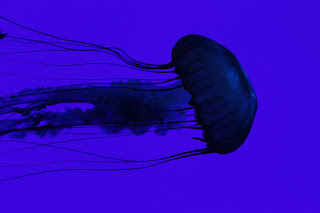If you go to the beach on coastal waters during the summer, you may notice strange gelatinous blobs lying on the sand. You may see what looks like a swarm of plastic bags floating on the waves. If you encounter the trailing tentacles of these creatures, you may develop a burning stinging sensation which is impossible to forget once experienced. Here’s what you need to know about jellyfish.
Although aquatic, jellyfish are not fish. They usually consist of an umbrella-shaped bell from which dangle tentacles armed with stinging cells. These nematocysts discharge a barbed stinger that injects venom into anything it touches; the jellyfish uses these stingers to catch prey and ward off enemies. Since the tentacles of some species of jellyfish are many meters long, you can be stung even if no jellyfish are visible. The dead jellyfish on the beach are also capable of stinging.
If you are stung by a jellyfish, some first aid measures are more effective than others. It appears that common treatments (vinegar, hot water, ice packs, meat tenderizer, even urine) may be ineffective or may only work for stings from certain kinds of jellyfish.
Start by scraping the affected skin with something stiff like the edge of a credit card to remove the jelly, tentacles and nematocysts. Dispose of the removed material; don’t leave it on the sand for someone else to step in. Then apply hydrocortisone cream to the damaged area to reduce both pain and inflammation. If the pain involves itching, antihistamines may help. Seek medical attention if these measures do not bring relief.
The best way to deal with jellyfish stings, though, is to avoid them. Pay attention to beach safety flags. Purple means marine pests such as jellyfish are present (but this doesn’t include sharks). Warning signs may also be used to help swimmers stay safe. It is wise to heed warnings about the presence of jellyfish, as the sting of some species can be deadly, especially to small children.

No comments:
Post a Comment
Got a Comment?